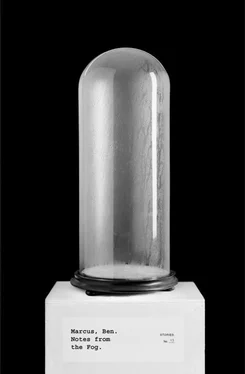Those friends, all of them, went the way of the drain. They floated out of their homes and turned to smoke. They rotted in place. None of them lived long, because nobody does. They wandered off into the sunless afterlife, sooner, later, eventually. You can look up their names and you won’t learn much. They packed no bags. Their stuff was probably just thrown away.
It was late April, the eleventh year of my marriage, when I was fired from my job as a teacher at Foley Parochial. Mr. Rubins, the chief anxiety machine at the school, called me into his office. Given the hour, lunch, and his initial silence when I walked in, I knew it could not be good. When is it ever good when someone says they need to talk to you? We should all know better. We should run for the woods when our name is called.
At Foley I was a floater. I roamed the lower grades, preaching the sort of science that doesn’t involve the human being. It’s a personal preference, a diversion from the official curriculum. The human being is a walk-on player in a spectacle that is none of its damned business. Even though we get our hands on everything. Crumple it up, try to mate with it or destroy it.
I taught chemistry, specializing in the wrong turns of science, the shit-crazed detours. You dive for knowledge, and the dive is long. It might take a lifetime. You come up empty at the end, but along the way you’ve shaped some brains, you’ve campaigned pretty hard to seat your error deep in the minds of others. It’s something I discussed with my students—the little, scrubbed, colorless beings who hated the planet, themselves, each other, and me especially. How every great insight is something to be embarrassed about later. The shelf life of truth, if it even gets on the shelf. What to do with all of our wrong ideas about the world and ourselves.
At Foley I never had my own homeroom group, thank god. A little fake family of sweating puppies who thought I could lick their wounds and vomit food into their mouths. Which is not to say that I do not care for some young people in this world. It is just a question of the role one plays. The costume worn. I had my own young people at home. I poured myself into them when I could.
At Foley I never struck a child, I hurt no one, I said nothing untoward or incorrect, so far as I know. It was my policy to do my job to the letter, then return home. At home I would rest up and restore myself to power, then rinse and repeat. Forever, if need be. Or that was the plan. I had it charted far into the abyss: how I’d survive my sweet term on the planet, gathering spoils and repelling misfortune, how I’d hit my marks and keep from breaching etiquette, hugging Gin close to me all the while. Because without a religion one must have a code. Without a code it’s like piloting a body with no bones through life, which some people do, god help them. Dragging a heap of skin from room to room, hoping people see you as a human being when you are only a spill. You’ve leaked from something larger that is gone now, not even a shadow, and you are all that remains. In the end it is too exhausting to approximate a real person. You deflate. Where your body was there is barely a face. Your skin gets kicked from room to room. Some child wears it, calls it his “shirt.”
Mr. Rubins sat me down, offered tea. He spoke of the world. He called it a place for feelings, for fun. He called it a room waiting to be filled by children. A system of linked rooms. Every so often these rooms empty out, and new children flood in, he explained. Some of us work to keep the rooms clean, well decorated, and ready for the next contenders.
The metaphor was problematic, of course. Worrisome. A poet I otherwise do not understand once said that we are disloyal to both things when we say that one is like the other. It is a kind of treason against difference. I hid my concern. It was fine for him to cushion the air with idiocies. I would grant him that favor, just as I might long for it now and then for myself. A time might come when it might be necessary for me to talk this way, too.
“We do our best, don’t we,” I said.
Mr. Rubins seemed pained. I must have as well. Who does not seem pained, finally, when you examine them closely enough? He looked at me as if I could help him with his task—to destroy me. Poor man. So out of his league. Death was coming soon, anyway, and then he’d rest in peace, or possibly squirm for all eternity in great agony. We don’t really know. Our vision of oblivion is clouded. It should concern us more than it does—how little we know, how little we are trying to find out.
Mr. Rubins spoke of people in general. What they need versus what they want. “Education, which is what we are selling here, finally,” he said, “makes a guess about this need every day.”
An educated guess? I wanted to ask.
“I wake up and I have to make the right choice,” he said.
Whereas I wake up and feel no pressure whatsoever, I didn’t say. I wake up and decide who among the earth’s gorgeous creatures I will make love to. That’s how easy I have it. A buffet of fuckery awaits.
It was wrong to feel anger toward him. Maybe it was wrong to feel anything at all. Mr. Rubins was being controlled by people in other rooms, I knew. Not in some alien way, but really, actually. These rooms were off-site, no doubt. Not at the school, maybe nowhere close. They had him on live feed, maybe. They had a mic in his ear, whispering formations, plays, strategies of attack. A wire pierced into the sweet core of his brain. Just so to speak, because I know that’s not how it really works. In all of the important ways he was not a real person, but simply a vessel for urges that originated elsewhere. A remote actor. In truth, the very same thing might have been said of me. A carrier pigeon for a set of feelings and ideas that were not mine. Tear away the body and what was left? I felt for a moment that I could stand up and prove what an apparition Mr. Rubins was, just move my hand through his body and wave it around. But perhaps he had the same thought of me, and it was a standoff. Two creatures equally ephemeral, looking to expose each other. A contest of ghosts, swishing through each other like so much wind.
I mumbled something to Rubins about the challenge of doing the right thing, the burden we all faced. And, above all, the responsibility we had to the children.
Mr. Rubins lit up. It was like I had touched him privately. “Exactly!” he shouted. “We have a responsibility to the children, and to their families.”
“And to the community,” I said firmly, waving my hand at the window. Because, of course, they were out there. They were wandering in the snow. They needed to be told what to do, what to think, what to feel.
I’m not stupid. I can read feelings. He was winding up to shitcan me and why not just get it over with? On his desk were papers he kept gathering to his body. He puzzled over what he saw on them, but we know what that means. I would use a similar tactic if I had an animal in my office who needed to be torn to pieces. I’d have a few of the same little tricks. The artificial face of confusion. The artificial face of concern. Postures of empathy and compassion.
“It comes down to atmosphere,” Mr. Rubins said. “The environment here and who is a good fit. It is tough for me to say this, but I also don’t think you will be surprised, Jay. I mean, it can’t surprise you to hear this.”
Oh, surprise. I looked into my past for the most recent example of real, genuine surprise. I used a fucking telescope and scanned that deep, black hole, back to my birth and maybe even before. Where was the surprise? I looked and looked but the field was bare.
“It’s a problem of fit, and I’m afraid I’m going to have to let you go.”
He blinked at me. I pictured us far above the earth, hanging from an aircraft, me holding on to his hand as he pulled his fingers away. He would let me go and I would fall and the feeling would not be unpleasant.
Читать дальше











